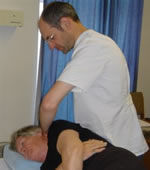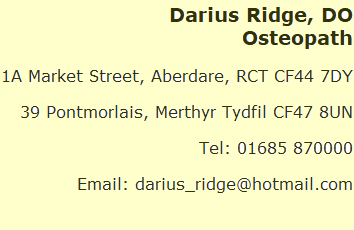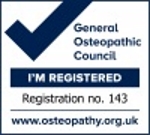Frequently Asked Questions (FAQs)
I have back/neck pains can a Registered Osteopath help?
Yes, Registered Osteopaths are trained specialists in diagnosing the cause of your back or neck pains and then providing an appropriate treatment to help you get better.
-
I know you treat the back and neck. Do you treat problems in other areas of the body?
Yes, osteopaths are trained specialists in diagnosing and treating the spine and joint/muscle problems in other areas. Please see our page what do Osteopaths treat? for more information.
I've been told by my General Practitioner (GP) that I've got to live with my joint/muscle pains, is this correct?
No, osteopathic treatment can generally help reduce pain and improve movement for a wide range of complaints.
-
Do I need to see my GP before coming in for treatment?
No, it's not necessary (unless you need referral under the terms of your health insurance). With your permission, we might need to notify your GP of the treatment that you have had.
-
How many treatments will I need?
This varies depending on how severe or longstanding your complaint is. There should be some improvement after each session and on average it may take 3 to 4 treatments to greatly improve your condition.
-
What is the difference between osteopathy and chiropractic?
Both of these therapies use manual techniques to adjust the body's structure. Chiropractic techniques rely mainly on spinal adjustments to realign the body. Osteopathy uses stretching and soft tissue techniques to relax the muscles as well as spinal adjustments to encourage better movement and improve the body's balance and structure.
- Will my health insurance pay for my osteopathic treatment?
Most health insurance policies include it, but check on your policy!
-
Will treatment hurt?
Generally no. If you are in a lot of pain, a gentler approach can be used to work within your tolerance.
Will you 'crack' my back?
The technique that makes a 'cracking' sound is often effective if it's appropriate for your condition. There are many other approaches that can be used if you prefer not to have this type of treatment.




